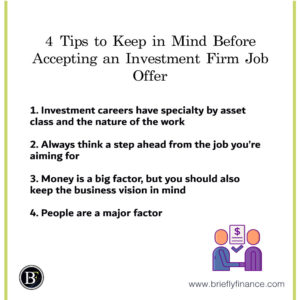At some point in your career, you may face a dilemma in choosing between several different job opportunities. For example, I recently had a discussion with a mentor about three opportunities I received from three separate investment firms. With this thought in mind, I thought I was share with you the some of the key details from the 30-minute call that I learned so much from.

Attribution: The icons has been designed using resources from flaticon.com
-
Investment careers have specialty by asset class and the nature of the work
When you are junior, you’re most likely a generalist. However, once you get experience, you have to decide whether you want to specialise in the buy side, sell side, or potentially even both. This also means the asset class that your prospective work provides.
While buy side jobs tend to be more about choosing investments that are suitable for your firm, sell side jobs are more focused on making a convincing investment thesis to sell to your investors.
One will have you receiving and researching potential investments; the other requires you to properly present your investment and handle their objections. This also means that, from the buy side, pressure will mostly come from your management team. Moreover, from the sell side, you will likely receive pressure from investors who want quick answers. But keep in mind that there are still situations where the job may appear to be hybrid in nature.
When it comes to asset classes, just know that they have very different experiences. For example, when working with a private equity investment, you may end up dealing with a single company which may have less available public information but more accessible management. However, when dealing with a public equity firm, the information is more readily available, but the management may not be unless you work with a large investment firm.
Before you make your final decision, have a thought about this, as these differences may influence how you work and how you analyse investment opportunities.
-
Always think a step ahead from the job you’re aiming for
When it comes to investments, you may need to work with privately owned institutions that do not permit sharing of information regarding the nature of their work or type of investments.
Being in such a place is highly prestigious and could pay you very well. However, it’s well worth keeping in mind that this could mean that moving to another job after that could be more difficult. This may harm your CV accordingly.
Only join firms if you plan on staying there for the long term basis; don’t just choose a job just to boost your CV. You should also remember that, in many cases, such firms will require your experience to be omitted because of that.
-
Money is a big factor, but you should also keep the business vision in mind
When you dedicate your life to your job, you will definitely care less about the money. However, it’s good to keep the vision of the business in your mind.
No one should have to dedicate their life to a cause that goes against their basic values. However, you may want to forego some incentives just to remain working in a place you like.
At the outset, money may be everything. At this point in time, you might not care as much about job satisfaction, but as soon as you start making enough from a job that doesn’t align with your values, you probably won’t feel as fulfilled anymore. This could negatively impact your life.
Imagine making a living from something you hate – but you can’t leave it, since you grew your whole life around this job. After all, especially if you have a family to take care of, you can’t just stop providing for everyone.
-
People are a major factor
Unlike the regular 9 to 5 job, investment firm offers will demand so much, and you will often be working around the same people for an extensive amount of time. In short, it’s entirely possible that you will end up spending more time with them than your family!
Do whatever you can to find out about the people and the culture in the organisation before you accept a job offer to see whether the staff fit with your mentality. Try to see whether some enjoy a social environment, prefer competitive workplaces, or if they simply want an environment where they don’t talk to anyone, finishing their work and going home at the first possible opportunity.
This does have a big influence; I would personally forgo some income just to not be with people I don’t like to work with.
Final Thoughts
As a fresh graduate, I know the situation can sometimes feel slightly different, especially if there’s not currently an alternative job to choose from. Going ahead for the job may seem like your only option. However, I hope that you manage to keep your plans in mind ahead of going to “just any” job. Make sure you choose somewhere that fulfils you emotionally and financially. The ideal job should also provide you with the necessary career progression path for your growth – so be sure to enquire about this, where possible.
Related Posts:
- 6 Financial Advice I Would Give My Younger Self
- 3 Practical Investing Books You Should Read
- 3 Must Have Value Investing Books for Beginners
Disclaimer: Above links includes affiliate links and at no additional cost to you, I may earn a commission. Know that I only recommend products, tools, services and learning resources I’ve personally used and believe are genuinely helpful, not because of the small commissions I make if you decide to purchase them. Most of all, I would never advocate for buying something that you can’t afford or that you’re not yet ready to implement.

